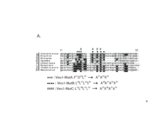| Description |
Progressive mitochondrial dysfunction is central to the development ofmany human pathologies including cancer, heart failure, and neurodegenerativediseases. Despite numerous studies convincingly connecting these disease states with mitochondrial dysfunction, the mechanistic bases remain elusive. Asignificant fraction of the mitochondrial proteome is uncharacterized but highlyconserved. The conservation of these proteins suggests they are important forbasic mitochondrial function. Using yeast, C. elegans and cultured mammalian cells, we have demonstrated that a novel, highly evolutionally conserved protein which we have designated VCP/Cdc48-associated Mitochondrial Stress responsive 1 (Vms1) is a crucial component of a previously unknown mitochondria-associated protein degradation pathway. Normally, Vms1 is in the cytoplasm in a stable complex with both Cdc48 (VCP/p97) and Npl4, components of the ubiquitinproteasome system. Upon mitochondrial stress, however, Vms1 recruits both Cdc48 and Npl4 to mitochondria. Based on the well-known functions of Cdc48 and Npl4 in ER-associated protein degradation, we hypothesized that Vms1 is a novel adaptor protein that recruits Cdc48 and Npl4 to mitochondria to promote the degradation of ubiquitinated mitochondrial proteins by the proteasome. Consistent with our model, deletion of VMS1 caused significant accumulation of ubiquitinated proteins in purified mitochondria as well as stabilization of Fzo1, the only known mitochondrial substrate of the ubiquitin-proteasome system inyeast. Moreover, a Vms1 mutant lacking Cdc48/Npl4 interaction was completely non-functional and overexpression of both Cdc48 and Npl4 could partially suppress the vms1Δ mutant phenotype, suggesting that the primary role of Vms1 is the recruitment of Cdc48 and Npl4 to mitochondria for degradation of mitochondrial proteins under stress conditions.Interestingly, the Vms1 localization is dynamically regulated by its intramolecularinteraction. In normal condition, this association keeps the protein in the cytoplasm. Upon mitochondrial stress, however, the interaction is disruptedso that Vms1 is targeted to mitochondria. We have also shown that this Vms1-mediated mitochondrial stress responsive quality control is conserved from yeast to worms to mammals. In the absence of this system, mitochondria progressively lose their function and cell and organismal death ensues. Greater understanding of the Vms1 pathway may, therefore, enable us to devise new approaches to cope with these disease states. |

























































































































